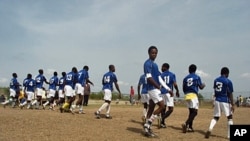While South Africa prepares to host the football [soccer] World Cup this week, some U.S. scholars are warning that the competition might worsen post-apartheid racial inequalities. They say preparations have further marginalized the poorest segments of South African society.
The World Cup will be a festival celebrating soccer and its legends in the making. But U.S. sociologists and economists worry about its potential social impact on ordinary citizens in South Africa.
Tony Roshan Samara of George Mason University in Virginia has been tracking the evolution of one of the host cities, Cape Town, during the past decade. A new stadium costing more than $600 million was built there to fit the competition's standards to host a semifinal match.
"In a city where you are struggling to provide housing, education, drug counseling services, in a city that is dealing with a horrible epidemic of methamphetamines, to spend that much money on building a stadium, it is a question of the allocation of resources - whether it is a smart allocation of resources for essentially a 90-minute soccer match when you have a city struggling with all these social and development issues," said Tony Roshan Samara.
Samara, who is writing a book about Cape Town, says that in preparation for the World Cup, homeless people have been moved to a camp outside the city center.
"It is an encampment where they have moved all of the homeless or many of the homeless who were downtown," he said. "And it is essentially a razor wire encampment where they are being kept and this is only the most egregious issue of displacement."
The George Mason University sociologist also points to hundreds of informal traders who have been moved away from the new stadium.
"The site of the stadium used to be a site of about 800 traders meeting every week to trade," said Samara. "It was a market, it had been there for at least 20 years, if not more. And it looks like they are gone for good."
Samara says the World Cup was presented as an economic opportunity for South Africans. But he argues that it is further fragmenting an already fragmented post-apartheid society.
U.S. economist and Africa expert James Stewart recently returned from a visit to South Africa. He also has concerns about the long-term implications of South African officials putting so much emphasis on a sporting event.
"They are spending large amounts of money they could otherwise be spending on improving the lives of the most disadvantaged," said James Stewart. "And clearly in South Africa, the number of disadvantaged and impoverished people is massive."
Stewart says he thinks South Africa will be a good World Cup host, and put on a good display for all of Africa. But he adds that a lot of work still needs to be done.
"I think it is an opportunity to dispel some of the myths about South Africa and about Africa in general," he said. "I think there are still a lot of people, particularly in the United States, who think about Africa in the ways in which it was portrayed in the Tarzan movies and clearly that is not the case. And there are tremendous opportunities for development. There is a lot of progress that is being made, but there is also a lot of additional work there that needs to be done. And for me coming from the United States as I traveled through and looked, I kept drawing comparisons to the historical process that the United States has gone through. And I would say that particularly in the rural areas, South Africa is probably about 50 years behind of where we are in terms of addressing racial inequalities."
Stewart says he sees similarities between the United States and South Africa. He says there are common challenges in addressing new development - making sure that already economically-challenged members of society do not become even more vulnerable.
Similar views have been posted on Internet message boards ahead of the World Cup. One writer, who wondered why so much money had been spent on the event, said he loves the soccer, but that human lives should come before it.
Other economists, soccer organizers and South African officials say the World Cup will bring economic opportunities now and later for all South Africans, and for Africa in general, by bringing attention to the continent's infrastructure improvements, tourism potential and vibrant mobile phone industry.
US Scholars Concerned About World Cup Impact on South Africa Society




